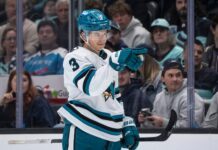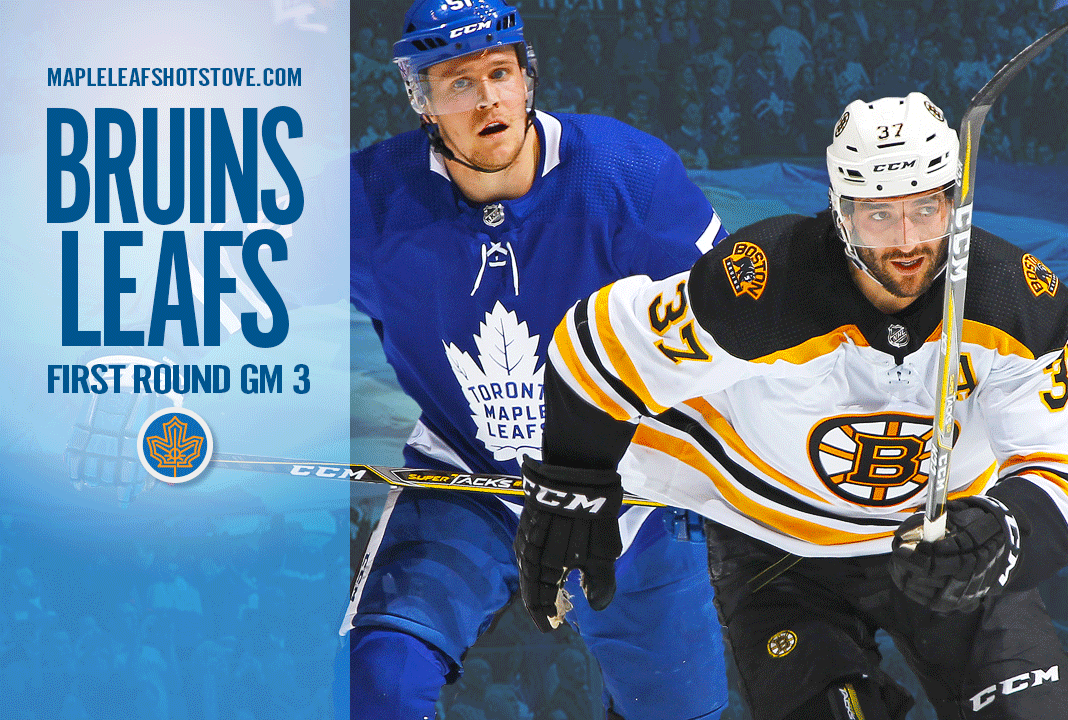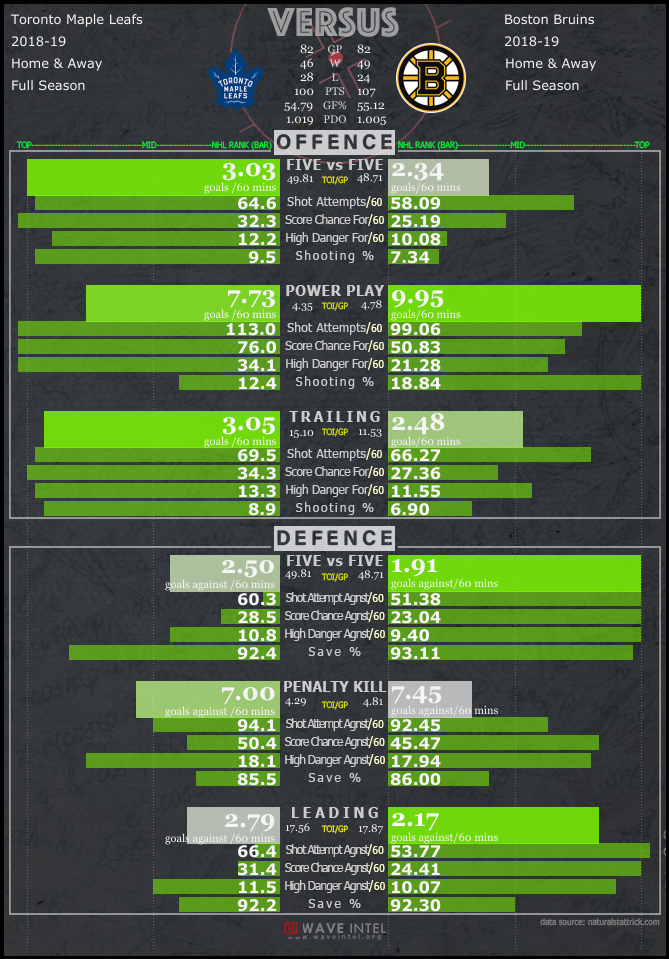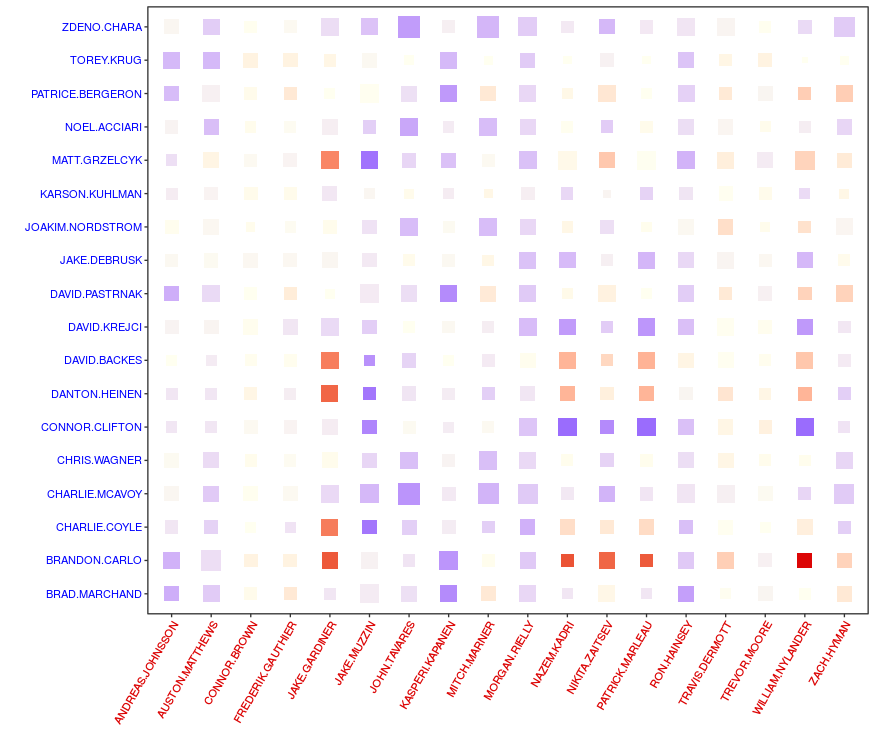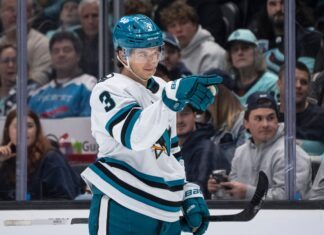After Saturday’s disappointing and dramatic loss, the intensity level in this series has been ratcheted up a notch as the now-best-of-five series moves to Toronto for a huge Game 3 (7 p.m, CBC, SN Ontario).
No one in Toronto wants a repeat of what happened on Saturday, but there’s something to be said about how quickly a playoff series can turn into absolute mayhem and provide a whole other level of entertainment value. No doubt, a lot of eyes will be on the way the officials manage the game tonight after things descended into chaos on Saturday night at TD Garden.
The controversy surrounding Game 2 somewhat distracted from the fact that the Leafs were badly outplayed in the game. As Babcock remarked, coming out of Boston with a split was the goal from the beginning, and warding off the response from a good team that lost Game 1 at home is never easy. Still, the Bruins executed a gameplan that made it difficult for the Leafs to generate speed through the neutral zone, get in behind and on top of the Boston defense, and manufacture much offensive-zone time. Toronto’s transition game is a big part of their attack, and Boston was much more aggressive than they were in Game 1 in defending that part of the Leafs‘ game — stepping up at their blueline more aggressively with their defense, tracking back harder with their forward group, and leaving Toronto with very little zone time and very few scoring chances overall. The Leafs will need to adjust, not just tactically but in the intensity of their overall compete level.
With Nazem Kadri out, the Leafs will go with a somewhat familiar sans-Kadri lineup as William Nylander will go back to center with Patrick Marleau and Connor Brown. The lack of experimentation in the Leafs lineup has been an incessant talking point this season and will be again now as there’s an argument to be made that neither Matthews or Nylander are in ideal positions to produce offense in this current configuration.
Brown and Marleau were two of the Leafs least productive forwards, sitting 9th and 10th in shot attempts for per sixty minutes this year (at least 200 mins played). Granted, Brown has shown, in minimal 5-on-5 ice time in two playoff games, some signs that he could be more involved than he was in the regular season. Marleau, having dropped off this year significantly, needs to find the supposed next level that veteran players often reach come post-season time. In a small sample of 76 minutes this year, Marleau-Nylander-Brown produced a stat-line of -4.5CF%rel (73 for, 84 against) and an xGF%rel of -7.4, by far Nylander’s worst results with any line. The loss in depth and trickle-down effect on the Leafs’ lineup that Kadri’s suspension creates pretty clear to see, but this is when they really need Marleau and Nylander to find another level in their respective games in a matchup vs. Charlie Coyle’s line that has been pretty effective through two games.
Considering how Torey Krug looked seconds after the hit that put him out of the game, it’s somewhat shocking to see him in the lineup tonight. Less so for Jake DeBrusk, who appeared to be okay after Kadri’s crosscheck to the head. Marcus Johansson, who missed Game 2 with an illness, remains out and isn’t with the Bruins in Toronto. Connor Clifton is also out with an injury and will be replaced by Steven Kampfer.
Game Day Quotes
Mike Babcock on the importance of depth:
We’ve talked about it all year long. You’re in the business of creating as much depth as you can in your organization. That’s an ongoing process. We’re trying to do that all the time. The key opportunity is you get to measure your depth. You can talk about it all you want; you get a chance to measure it. Injuries, suspensions are all part of hockey and so you’ve just got to find a way to be better.
Babcock on Nylander and his series so far:
He’s got to play hard. It’s real simple — the team that played the hardest won Game 1, the team that played the hardest won Game 2. I think one team played well in Game 1, one team played well in Game 2 — I don’t think both teams have played yet. I think you’ve got a chance of that happening tonight and it’ll make for a good hockey game.
Babcock on last change at home:
Last change is always great when you’re ahead. Out changing the other team and running their bench is the easiest when you’re ahead. When you’re chasing the game and not playing good, the other coach gets to do whatever he wants whether you’re at home or on the road because you’re always behind. I don’t know if that makes any sense. It’s dependent on two things — last change is great, but [it depends] on how you’re playing and the score in the game.
Bruce Cassidy on his team’s physical buy-in and how Coyle and Pastrnak are leading the team in hits:
I assume it is the leadership group that sets the tempo. We need to play to our identity. We did that much better in Game 2 than in Game 1.
David Pastrnak’s been through it a little bit now; it’s his third go-around in the playoffs. He understands what it takes and that you’ve got to bring a hard-to-play-against mentality, whether that is winning your puck battles, winning your foot races, getting to the net for a second chance, or finishing your check when it’s there — all of the above.
Charlie Coyle has been through it. In Minnesota, he was a good player for them in the playoffs. I’m not surprised by him.
Our leadership group kind of sets the tone and we demand as a coaching staff and leadership group a certain standard of play. We didn’t meet in in Game 1. We’ve acknowledged that and accepted it and moved on. In Game 2, we did.
Cassidy on how his team responds when the temperature of a game rises:
We will mention that if it goes up, to make sure that we play between the whistles. The scrums start and they start peeling a guy off and that’s where the game gets [silly]. Just play hard between the whistles. Again, we’ve got guys who have been around. They understand it is going to go up. Bergy and March and Z have played a lot of playoff series and have been in two Finals. They know the temperature goes up.
If we take a hit, you can’t just chase a guy down. You’ve got to have some level of discipline and sort out how you are going to change that momentum. It is not about getting a guy back that hits you. There would be no players left on the ice because there are so many good hits in the playoffs. You’ve got to manage that part of your aggressive tendency or your willingness to stand up for a teammate or exact revenge. I think our guys are just veteran guys who can calm the guys down. As a coach I don’t need to do that when you have that many guys there.
Matchup Stats
Game 2 matchups from corsica.hockey:
Toronto Maple Leafs Projected Lines
Forwards
#11 Andreas Johnsson – #34 Auston Matthews – #24 Kasperi Kapanen
#11 Zach Hyman – #91 John Tavares – #16 Mitch Marner
#12 Patrick Marleau – #29 William Nylander– #28 Connor Brown
#42 Trevor Moore – #33 Frederik Gauthier – #63 Tyler Ennis
Defensemen
#44 Morgan Rielly – #2 Ron Hainsey
#51 Jake Gardiner – #23 Travis Dermott
#8 Jake Muzzin – #22 Nikita Zaitsev
Goaltenders
#31 Frederik Andersen
#30 Micheal Hutchinson
Scratched: Nic Petan, Martin Marincin, Justin Holl, Igor Ozhiganov
Suspended: Nazem Kadri
Boston Bruins Projected Lines
Forwards
#63 Brad Marchand – #37 Patrice Bergeron – #88 David Pastrnak
#74 Jake Debrusk – #46 David Krejci – #83 Karson Kuhlman
#43 Danton Heinen – #13 Charlie Coyle – #42 David Backes
#20 Joakim Nordstrom – #55 Noel Acciari – #14 Chris Wagner
Defensemen
#33 Zdeno Chara – #73 Charlie McAvoy
#47 Torey Krug – #25 Brandon Carlo
#48 Matt Grzelcyk – #44 Steven Kampfer
Goaltenders
#40 Tuukka Rask
#41 Jaroslav Halak
Injured: Sean Kuraly, John Moore, Marcus Johansson, Connor Clifton

